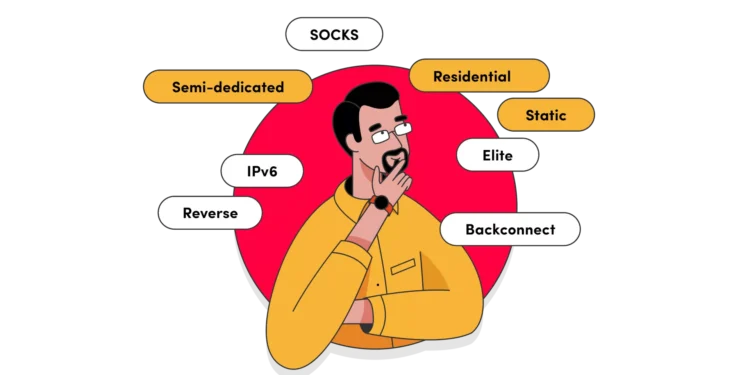Proxies are hardware or software systems with a designated IP address that intercede the connection between a server and the website user. They offer a controlled and secure gateway for internet users to access their queried web pages. Proxies add a shield of protection to your internet connection, preventing cyber-attacks and privacy invasion.
What Kinds of Proxies Are There?
Proxies reside on your local computer or at a unique point between the target servers and your local computer. There is a proxy for virtually every browsing need, be it enhancing security, accessing location-specific content, or private browsing. For example, in e-commerce, proxies can be used for competitor analysis and market research, among other related tasks in the niche. Let’s check out the different types of proxies in the market today.
Forward/Anonymous Proxies
Forward proxies are single-point entry proxy servers that provide IP address security to internal networks, enabling seamless administrative control. These proxy servers don’t respond to external network queries, limiting your business’s ability to tackle individualized end-user needs.
Anonymous proxy servers create untraceable browsing footprints by accessing the internet on your computer’s behalf. They hide your computer data and personal identification details.
High Anonymity/Distorting Proxies
High anonymity proxies add double-layered security and anonymity to your internet connections. They’re highly responsive data erasers that clean your browsing data and computer information before connecting to the target website.
Distorting proxy servers are crafty proxies that display their titles but hide their true identity. These proxies create browsing footprints of a location you’re not currently in, preventing websites from recognizing where you actually are.
Datacenter Proxies
Datacenter proxy servers are physically based in facilities with cutting-edge computing infrastructure. They’re cost-effective proxy servers that deliver quick response times. These proxies are common for market research and competitor analysis. They shield users from getting noticed by intelligent search engine bots. Datacenter proxies achieve the highest anonymity levels, enabling you to harvest massive amounts of data affordably.
Residential Proxy Servers
A residential proxy server assigns you an IP address for a designated physical device. It then channels all the requests sent from your computer through that device. These proxies enable website owners and social media marketers to verify ads featured on their sites, among other things. If you want to identify and block unwanted ads from competitors, check out the residential proxy services from IPRoyal.
Public proxy servers are free proxies that assign you a unique IP address while hiding your actual identity. These proxies meet and exceed the need for affordable browsing but aren’t the safest and fastest options available. The free aspect of the proxies makes their demand pretty high, which leads to slower response times and a great deal of cybersecurity threats.
In the case of shared proxies, they’re multifaceted proxies used by multiple users simultaneously. The IP addresses assigned to your computer by shared proxies are often used by many. Like public proxies, shared proxy servers meet the criteria for cheap surfing but aren’t ideal for logging in to data-sensitive websites.
SSL Proxy Servers
The secure sockets layer (SSL) proxy server decrypts a server-to-client connection while hiding its true identity from both. SSL proxies are common among organizations seeking to keep their browsing data and online connections secure from SSL protocol-related threats. They are the best option for website owners looking to rank higher on search engines. Google favors SSL-encrypted websites, meaning connecting to your site via these proxies gives you an edge over others.
Rotating/Reverse Proxies
Rotating proxies have a pool of IP addresses for surfers to use. They assign a unique IP address to every user and are suitable for people who perform high-volume and continuous web scraping. These proxies enable you to visit one site multiple times without revealing your identity.
Reverse proxies intercept search queries from a website user at the web server’s network edge. They then transmit to and receive the requests from the origin server. These are the most popular proxies because they reduce bandwidth load. Sadly, they expose one’s HTTP server architecture to attackers.
Conclusion
Proxies mask your IP address while reinforcing your browsing security. If you run a business, you need proxies to keep sensitive company data safe while supercharging your website’s response times. Some proxies balance internet traffic, preventing crashes and minimizing bandwidth use. Think about your use case the next time you’re picking a proxy service!











